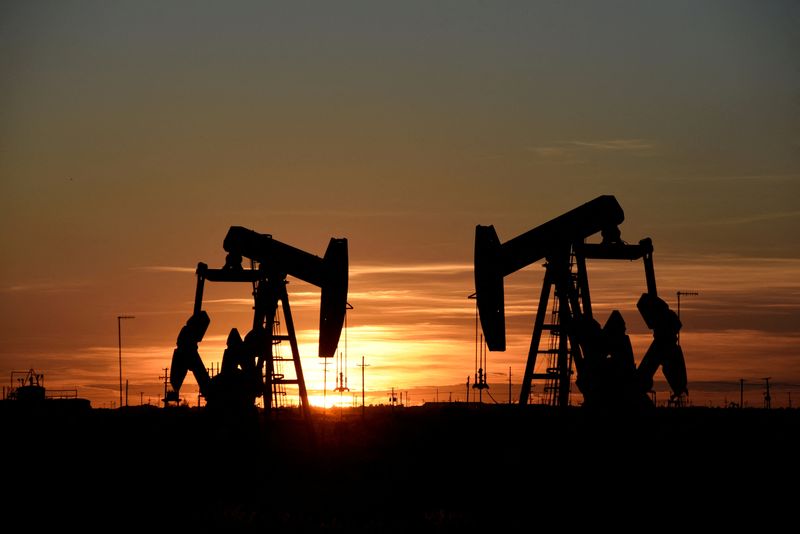 © Reuters. FILE PHOTO: Pump jacks operate at sunset in an oil field in Midland, Texas U.S. August 22, 2018. REUTERS/Nick Oxford/File Photo
© Reuters. FILE PHOTO: Pump jacks operate at sunset in an oil field in Midland, Texas U.S. August 22, 2018. REUTERS/Nick Oxford/File PhotoBy Florence Tan and Emily Chow
SINGAPORE (Reuters) -Oil prices fell on Monday, giving up earlier gains, as global producers will likely keep output unchanged during a meeting this week and investors are cautious ahead of a U.S. Federal Reserve meeting that may spur market volatility.
futures fell 74 cents, or 0.8%, to $85.92 a barrel by 0710 GMT while U.S. West Texas Intermediate crude was at $79.07 a barrel, down 61 cents, or 0.8%.
Ahead of the Federal Reserve’s policy meeting scheduled on Jan. 31-Feb. 1, the market broadly expects the U.S. central bank to raise interest rates by at least 25 basis points, increasing concerns that the Fed’s extended increases in borrowing costs will choke fuel demand growth in the world’s biggest oil consumer.
Oil prices “are likely being weighed down by potential interest rate hikes in the upcoming Fed meeting,” said Serena Huang, head of APAC analysis at Vortexa, in an email.
Ministers from the Organization of the Petroleum Exporting Countries (OPEC) and allies including Russia, known collectively as OPEC+, are unlikely to tweak their current oil output policy when they meet virtually on Feb. 1.
Still, an indication of a rise in crude exports from Russia’s Baltic ports in early February caused Brent and WTI to post their first weekly loss in three last week.
“No change to the OPEC+ output is expected to be announced at this week’s meeting and we expect outlook commentary from the U.S. Fed to be the key driver of the outlook in the near term,” said National Australia Bank (OTC:) analysts in a research note.
Oil prices rose earlier on Monday amid tensions in the Middle East following a drone attack in oil producer Iran.
While it is not clear yet what’s happening in Iran, any escalation there has the potential to disrupt crude flow, said Stefano Grasso, a senior portfolio manager at 8VantEdge in Singapore.
China, the world’s biggest crude importer, pledged over the weekend to promote a consumption recovery which would support fuel demand after it ended strict COVID-19 curbs in December.
The country resumes business this week after its Lunar New Year holidays. The number of passengers travelling prior to the holidays rose above levels in the past two years but is still below 2019, Citi analysts said in a note, citing data from the Ministry of Transport.
“Overall international traffic recovery remains gradual, with high-single to low-teens digits to 2019 level, and we expect further recovery when outbound tour group travel resumes on Feb. 6,” the Citi note said.